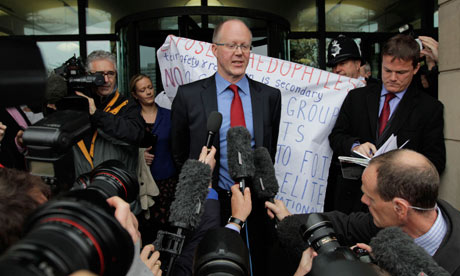
When it comes to the Jimmy Savile affair, we constantly seem to be asking the wrong questions. Normal people, who don't work in the bubble that is media journalism, are mystified why a grim scandal about sexual abuse by a celebrity, in hospitals, care homes and elsewhere, is so often reduced to a row about the BBC. That the BBC's response has been variously slow and not very reassuring is of course part of the answer, but that only grips part of the point. Britain is only one missing tie or apology to Buckingham Palace away from a row about the BBC; and that is symptomatic of the nation's culture wars, which are mostly conducted on the terrains of Television Centre and Broadcasting House. To not participate is to vacate the space to the critics armed and ready to assert their values instead.
It is a sport that the political class plays with as much gusto as the rest of us. One could only wish MPs might show any interest in more important matters, although if the utter silence that greeted the takeover of EMI is anything to go by, the fall of Penguin (if that is the outcome, in effect, of the talked-of deal with Random House) is likely to be accompanied by another silent whimper. Such is the fallacy of our public organisation/private company distinction that the restructure of other creative industries in which Britain excels is treated as of no importance, if it occurs in the private sector where only regulators, not politicians, are deemed fit to have a view. Mind you, perhaps nothing in media matters, unless it's been on telly. Another reason why people care more about the BBC.
Anyway, the problem, on this occasion, is that it is difficult for those who respect the corporation's output to support the organisation. It's possible, of course, that somebody will uncover the "killer email" that shows that the Newsnight investigation was squashed so a cheap Christmas Savile tribute could go ahead. But the search for conspiracy is another example of asking the wrong question. Only in the past week or so has it dawned what the real issue is: why on earth, once Newsnight had got together some evidence about abuse by Savile, did none of the executives involved insist on doing everything possible to get this investigation to air?
Things now look worse for not just the hapless Newsnight editor, Peter Rippon, but his superiors – the head of news ,Helen Boaden and her deputy, Stephen Mitchell, depending on what they knew about the aborted film. As for George Entwistle, and his predecessor Mark Thompson, on their accounts at least, neither knew enough to insist on more research. Perhaps they should have done, although the James Murdoch management handbook for senior executives teaches that it is far better to be ignorant of a scandal in one part of the organisation, than to be even slightly aware of it. Rather than ask any questions at all, it is safer for people in charge not to bother. At this rate "incurious" will become the most overused word of the year.
We shall see what the executives' defence looks like when the Pollard review concludes in a few weeks; meanwhile, it is striking that the boss class has been bested by two passionate Newsnight journalists. It wouldn't happen anywhere else, BBC defenders like to say, that a broadcaster could so fearlessly interrogate itself as it did on Panorama; or that it would allow two reporters to so openly defy their superiors, by providing Panorama's best information in a series of leaked emails. That they have been allowed to get away with it, though, is not just because of journalistic freedoms within the BBC, but because the public at large are disgusted by the abuse that Savile perpetrated. And it is because he was, more than anything, a BBC star, that the corporation cannot easily get out of the line of fire.







